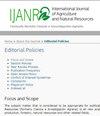Developing a Land Suitability Model for Cereals in the Algerian Sahara Using GIS and Hierarchical Multicriteria Analysis
IF 0.5
4区 农林科学
Q3 AGRICULTURE, MULTIDISCIPLINARY
International Journal of Agriculture and Natural Resources
Pub Date : 2022-01-01
DOI:10.7764/ijanr.v49i1.2323
引用次数: 2
Abstract
Determining land suitability is a preliminary procedure to define and determine land fitness for a given type of production. A suitability analysis performed with inadequate methods will not guarantee a successful or significant process. The current attempt to consider new strategies and techniques for the Algerian agricultural systems comes as a part of a process of reflection that aims to understand the land resource planning process for agriculture, specifically in Ouargla, Algeria. The aim of the study is also to present a process that is based on the use of geographic information systems (GIS) and hierarchical multicriteria analysis; this process has demonstrated its relevance to the understanding of complex spatial problems. The suggested approach provides an information reference for the construction of soil suitability maps for cereals in N’Goussa at Ouargla. Farming factors, such as the slope, soil characteristics, electrical and road networks, and land occupation, were integrated into the soil suitability map for cereals by using the geographic information system. Multiplying the weighted coefficients linked to these factors allows for a global land suitability map. The obtained results allow for the prioritization of the sites into four classes: high suitability, moderate suitability, low suitability and unsuitability. In fact, 60.06% of the total area is moderately suitable for cereals.利用GIS和分层多标准分析在阿尔及利亚撒哈拉开发谷物土地适宜性模型
确定土地适宜性是定义和确定土地适合某一生产类型的初步程序。用不适当的方法进行适宜性分析不能保证一个成功或重要的过程。目前为阿尔及利亚农业系统考虑新战略和新技术的尝试是反思过程的一部分,旨在了解农业土地资源规划过程,特别是在阿尔及利亚的瓦尔格拉。这项研究的目的还在于提出一个以使用地理信息系统和分层多标准分析为基础的过程;这个过程已经证明了它与理解复杂空间问题的相关性。该方法可为瓦尔格拉地区恩古萨地区谷物土壤适宜性图谱的构建提供信息参考。利用地理信息系统,将坡度、土壤特征、电网和路网、土地占用等农业要素整合到谷物土壤适宜性图中。将与这些因素相关的加权系数相乘,就可以得到全球土地适宜性地图。获得的结果允许将站点优先级分为四类:高适宜性,中等适宜性,低适宜性和不适宜性。实际上,全国60.06%的面积适宜种植谷物。
本文章由计算机程序翻译,如有差异,请以英文原文为准。
求助全文
约1分钟内获得全文
求助全文
来源期刊

International Journal of Agriculture and Natural Resources
AGRICULTURE, MULTIDISCIPLINARY-
CiteScore
2.40
自引率
0.00%
发文量
0
 求助内容:
求助内容: 应助结果提醒方式:
应助结果提醒方式:


